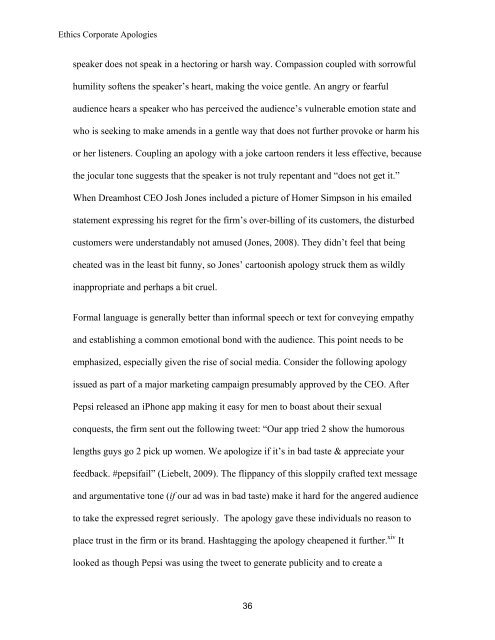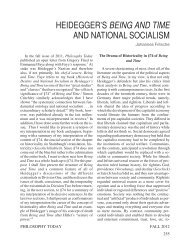Why Saying “I'm Sorry” Isn't Good Enough: The Ethics of Corporate ...
Why Saying “I'm Sorry” Isn't Good Enough: The Ethics of Corporate ...
Why Saying “I'm Sorry” Isn't Good Enough: The Ethics of Corporate ...
Create successful ePaper yourself
Turn your PDF publications into a flip-book with our unique Google optimized e-Paper software.
<strong>Ethics</strong> <strong>Corporate</strong> Apologies<br />
speaker does not speak in a hectoring or harsh way. Compassion coupled with sorrowful<br />
humility s<strong>of</strong>tens the speaker’s heart, making the voice gentle. An angry or fearful<br />
audience hears a speaker who has perceived the audience’s vulnerable emotion state and<br />
who is seeking to make amends in a gentle way that does not further provoke or harm his<br />
or her listeners. Coupling an apology with a joke cartoon renders it less effective, because<br />
the jocular tone suggests that the speaker is not truly repentant and “does not get it.”<br />
When Dreamhost CEO Josh Jones included a picture <strong>of</strong> Homer Simpson in his emailed<br />
statement expressing his regret for the firm’s over-billing <strong>of</strong> its customers, the disturbed<br />
customers were understandably not amused (Jones, 2008). <strong>The</strong>y didn’t feel that being<br />
cheated was in the least bit funny, so Jones’ cartoonish apology struck them as wildly<br />
inappropriate and perhaps a bit cruel.<br />
Formal language is generally better than informal speech or text for conveying empathy<br />
and establishing a common emotional bond with the audience. This point needs to be<br />
emphasized, especially given the rise <strong>of</strong> social media. Consider the following apology<br />
issued as part <strong>of</strong> a major marketing campaign presumably approved by the CEO. After<br />
Pepsi released an iPhone app making it easy for men to boast about their sexual<br />
conquests, the firm sent out the following tweet: “Our app tried 2 show the humorous<br />
lengths guys go 2 pick up women. We apologize if it’s in bad taste & appreciate your<br />
feedback. #pepsifail” (Liebelt, 2009). <strong>The</strong> flippancy <strong>of</strong> this sloppily crafted text message<br />
and argumentative tone (if our ad was in bad taste) make it hard for the angered audience<br />
to take the expressed regret seriously. <strong>The</strong> apology gave these individuals no reason to<br />
place trust in the firm or its brand. Hashtagging the apology cheapened it further. xiv It<br />
looked as though Pepsi was using the tweet to generate publicity and to create a<br />
36

















